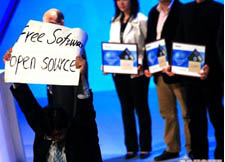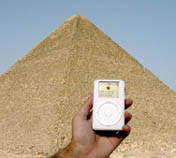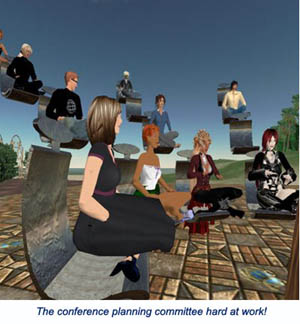
Picture from ilounge.
This week the announcement by Bob Geldof of his Dictionary of Man or Encyclopedia Humanica triggered a discussion on digital divides.
Live Aid founder Bob Geldof and the BBC announced Tuesday they had joined forces on an ambitious multi-media project to produce a Dictionary of Man [aka Encyclopedia Humanica] that will be a complete record of humanity.
Geldolf said the web-based Dictionary would be a limitless repository of content: an immense, digital catalogue of all current human existence and an enormous resource for the exchange of ideas and information.
There was some criticism of the apparent culture in aspic paradigm. Culture Matters pointed out that The Dictionary of Man project seems to be framed in these early press releases in an outdated mode of cultural preservation that ignores that “new diversity is created by the encounter between global consumer goods, media, ideas and institutions with local ways of doing and thinking.”
But, my favorite comment on the DoM project was on The Village Pump:
eh, it might be a bit uncoordinated.. but don’t we already call this ‘the internet’?
Oh well, more power to him, I guess. A freakishly massive undertaking, to be sure.
Yes the internet would already be on its way to being the Encylcopedia Humanica, if it wasn’t for digital divides, or rather lets call it Wikipedia Humanica, or even Humanica Life – the potential offspring of Second Life after it goes open source server side, (see announcement).
But, unless digital divides are addressed the internet is a long way from being a platform for all Humanica. And, while Geldof indicated that the DoM website may be up as early as next week, it is not clear from the press release how they will include voices from any of the 900 cultures that will be “captured” by camera crews.
I first saw picture on the left on Boing Boing and traced it back to Wired , and then ilounge where it is currently up to 28,347 views. The picture is captioned, “Female member of Mursi tribe in Southern Ethiopia.” There is no other background on the photo that I have found yet. But, I include the picture to the right for anyone who is not familiar with the genre of ilounge photos – ipods displayed in exotic locals.
When seen on its own the photo on the left suggests that a digital divide is being crossed, in context of other ilounge photos it seems to indicate a digital chasm.
But there was some good news this week in terms of bridging digital divides. From the i-witnesses:
At long last the World Bank has approved a US$164.5 million package to connect East and Southern Africa to the global broadband infrastructure – which will enable cheaper access to the internet and international phonecalls.
And, from Screenshots:
iBurst, is said to have transformed wireless broadband in Africa. The buzz will be in KL next Thursday: MoBif and Kyocera are bringing iBurst International Forum 2007 to town.
“Freakishly Massive”
And, then there is the “freakishly massiveness” of the Encyclopedia Humanica undertaking. The internet, in all its wiki open source glory, is the only media which makes such a project is even imaginable.
But, massive projects approached from the principle of sharing from the bottom up are what has defined the power of open sourcing to create new processes for businesses and society. And, these processes have gone well beyond their origins in software development.
Open Source evangelist Dana Blankenhorn’s famously posted on:
Blankenhorn asks: “If you can change the way things work in AIDS vaccines, how about the world’s other pressing challenges? And if Bill Gates can learn the value of sharing, isn’t that the final proof open source works?”
Open Source activism has been in the news this last week when an open source heckler at Bill Gates recent talk at Bejing university seized a photo op.


The picture on the left is from Boing Boing and the picture on the right AP Photo/Elizabeth Dalziel.
But, if Bill Gates is not yet willing to put his money where his mouth is on open sourcing, Linden Labs it seems is.
“Having already taken the timid steps of open-sourcing the code for its client software, Linden Lab has confirmed that they’ll be going the whole way, and will soon be opening up the server code for Second Life. This furthers Second Life’s ambitions to be a fully distributed 3D network — built on interoperability and not owned by one company — a bit like the Internet itself.
ZDNet’s The Social Web asks: ‘who will be the first to offer Second Life hosting or use the server code for their own internal purposes? IBM would be an obvious candidate, perhaps offering corporate Second Life services. And for the rest of us? GoogleLife, free virtual land — ad supported of course. It’s certainly a possibility.’”
Humanica Life: virtual worlds serving all humanity.
It was quite clear at Virtual Worlds 2007 that IBM has no intention being caught napping re virtual worlds. The IBM key note speaker, Colin Parris, succinctly articulated the potential of virtual worlds to facilitate large scale collaborative innovation across geographical boundaries. Also noted was the power of virtual worlds to enhance learning by leveraging a variety of sensory inputs and to realize an individual’s potential that comes only from being able to tap into a larger network of people.
IBM is clearly focusing on making virtual worlds “fit for business and society.” But, without at the very least a discussion of virtual citizenship from the rest of us, will virtual worlds ever be fit for humanity?
I would really like to thank all the folks who discussed virtual citizenship in their comments on my last post, Can you be a citizen in a virtual world? This topic was well beyond the scope of my own imaginings. But, it came to life for me in the discussion of Aleister Kronos,Team Mascot, Gwyneth Llewelyn, Tisha, Dandellion Kimban, and Ziggy Figaro.
Some projects to watch re Humanica Life
African Path – “is one of the most exciting African citizen media projects. It is an online platform whose content comes from bloggers, readers, artists, and specialists. It also aggregates news on Africa from different sources (Global Voices).”
Language Labs - this Beta Technologies build and their client, Language Labs, have been getting a lot of press lately.
Second Life International Education Conference, May 25th, 2007
Tags: Second Life | Virtual Worlds | Virtual Reality | Virtual Citizenship | Virtual Citizen | Web 3.D | Bob Geldof | Dictionary of Man | Encyclopedia Humanica | Open Source | Bill Gates | Africa | internet | e-learning | internet development | Wikipoedia | digital divides | global development | positive global development | wireless broadband | open sourcing | user generated content |




0 Comments For This Post
1 Trackbacks For This Post
April 29th, 2007 at 12:17 pm
[...] UgoTrade – Encyclopedia Humanica and the Internet’s Destiny [...]